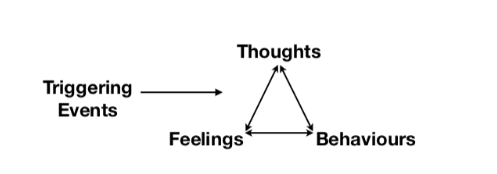How does Cognitive Behaviour Therapy Work?

Learn How Cognitive Behaviour Therapy Can Benefit You
Cognitive Behaviour Therapy, also known as CBT, is a modern type of talk-therapy that works extremely well for emotional issues, like depression, anxiety, trauma, obsessive-compulsive disorder and low self-esteem. It also works well with many behavioural issues, like over-eating, avoiding and procrastinating. There is an enormous body of research showing how CBT can benefit almost anyone.
What is the Cognitive Model?
CBT works based on a theory called the cognitive model. The cognitive model says that thoughts, feelings, and actions are all connected and influence one another. You can imagine this relationship in the form of a triangle. Whenever we experience anything (that is, whenever an event triggers us to react) the brain automatically processes everything we know about that person, situation or thing. It immediately looks to our history and lets us know whether we believe that thing is “good,” “bad,” “safe” or “dangerous”. Physical feelings and emotions that are in-line with that assessment then activate, mostly to get our attention and to prepare us for immediate action, and then we act.

For example, if you’re out, enjoying a walk in the woods on a beautiful summer day and your eye sees something long and thin, moving on the ground, your brain might immediately register “Snake” and, perhaps “DANGER!”. Right away, your body’s arousal level spikes up and you might freeze in your tracks. This takes milliseconds because millions of years of evolution have taught human bodies that the odds of survival are greatest when we react instantly and get out of trouble’s way.
How Cognitive Behaviour Therapy Can Help With Depression?
The cognitive model says that people feel depressed because they experience (and believe!) depressing thoughts that move them to do things that make them feel more depressed. For instance, many of our depressed clients report that when they’re feeling down, they are more likely to have thoughts like “Here we go again. Nothing is ever going to change.” and “I just can’t do this. I’m a failure.”
Those types of depressing thoughts create sad and hopeless feelings, which make it seem harder for people to ‘roll up their sleeves’ and put in the hard work needed to change their situation. Instead, when those negative thoughts and depressed feelings are present, people are more likely to want to retreat, get back in bed, eat for comfort and withdraw socially.
CBT for depression works by helping people to realize what they’re thinking and what they’re doing in those moments when they feel down. Here at SHIFT, a centre for CBT in Oakville, we teach people suffering from depression how to recognize depressing thoughts as what they are — just thoughts! We show them how to examine those thoughts to see if they make any sense because often, depressing thoughts are just holdovers from the past, and not accurate reflections of the present or the future.
We also show our clients how to catch themselves in the act of doing things that only leave them feeling worse, and then escape from those problem behaviours. Just because you find yourself doing those things you’ve always done for comfort when you felt rotten doesn’t mean you can’t take this moment to start over and try again. We help our clients recognize their high-risk situations and develop plans to avoid the old pitfalls and do things that leave them feeling stronger, more capable and in more control over their emotions. CBT for depression can take anywhere from 6 – 20, one-hour sessions and most people with extended health benefits have some coverage for our psychological services.
A Client Story – ‘Susan’

‘Susan’ is a lovely, divorced, woman with teen children who came to us because of depression. Like many young adults, she didn’t know what she wanted to do as a career when she finished university and took a job that ended up being a very poor fit with her skills. The employer fired her, an experience that was made worse when her family responded poorly and blamed her for what happened.
Susan said that experience was so shocking, it left her feeling and believing that she was “a complete failure”. A few years later, she experienced postpartum depression after giving birth to her first child and her mother-in-law, who did not understand depression believed Susan was just “lazy”. Susan said her in-laws “looked at me like I was this lazy slob who didn’t know how to handle her own children.” That, and the firing a few years earlier left her feeling like she was just a “broken” person. She returned to those thoughts and feelings over the next thirty years, whenever she felt down or experienced some challenge in life.
Susan’s treatment took the form of helping her to notice how those thoughts took over when she felt down. We showed her how to recognize them as antiques from her past and to really look at her life experiences so she could see that she also had many successes and strengths. She came to realize how vulnerable she was in those early-adult years, and how her family’s poor reactions to her challenges were their problems, not hers, which allowed her to view herself from a more compassionate and accurate point of view.
An important part of Susan’s treatment also involved helping her to see that she coped by retreating into bed and eating when she felt down. The inactivity and the weight she gained only convinced her even more that the “I’m a complete failure” thoughts were true. A treatment plan that included steps for leaving the bed, reconnecting with friends and being more active in her life helped her break that vicious circle of depression.
Susan is now back to work, full-time and feels she has the tools to keep herself living well. Her job and life still have their challenges, but she feels strong enough to work through them and not return to those unhealthy patterns she had been in for so long.
Let us know if you’re looking for CBT to fight depression in Oakville.
The post How does Cognitive Behaviour Therapy Work? appeared first on Shift Cognitive Therapy.
